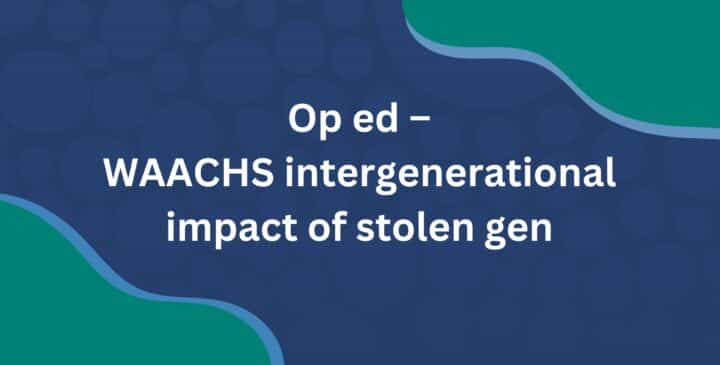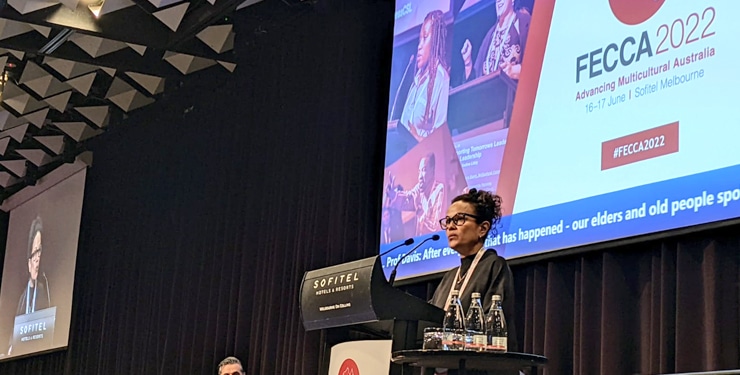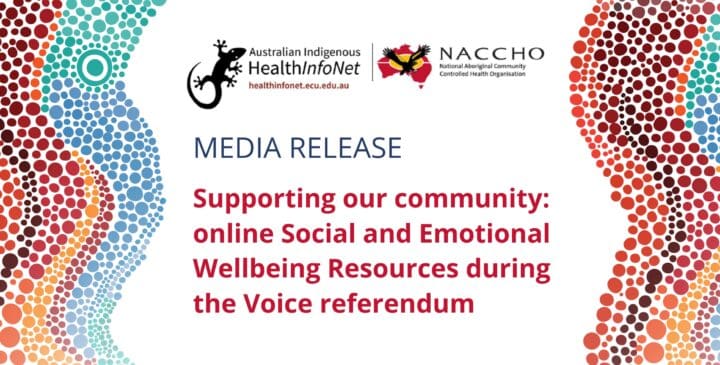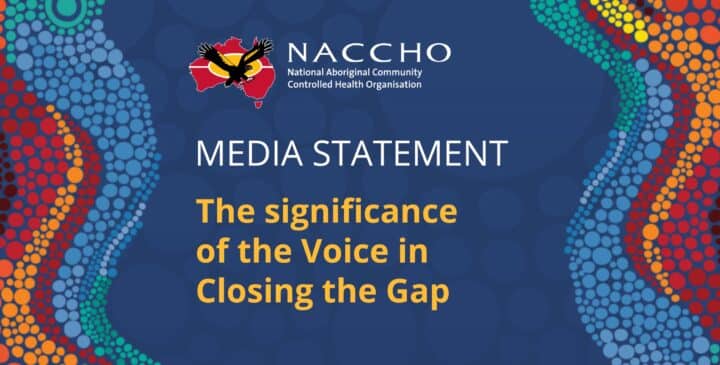

Systemic Racism In Health
Speech by NACCHO Chair Ms Donnella Mills at FECCA 2022 Conference, Melbourne.
Good morning everyone, and good morning to my fellow panel member Dr Chris Lemoh.
Thank you for inviting me here today.
My name is Donnella Mills. I am a Director of Wuchopperen Aboriginal Community Controlled Health Service and Chair of the National Aboriginal Community Controlled Health Organisation – NACCHO. I am also the managing lawyer at LawRight Community Legal Centre in Cairns.
Before any of those positions and titles, I am foremost a First Nations person.
I am a Torres Strait Islander woman with ancestral and family links to Masig and Nagir.
I am a First Nations mother, daughter, sister, aunt, and cousin.
I acknowledge the traditional custodians of the lands where we are meeting today.
We are on the lands and home of the Boon Wurrung and Woiwurrung (Wurundjeri) peoples of the Kulin Nation, who, for many thousands of years, have taken care of the place now known as Melbourne and its greater region.
The Wurundjeri peoples have intimate knowledge of their lands and waters, flora and fauna, seasons and weather.
I also acknowledge all Aboriginal and Torres Strait Islander peoples here today.
The Wurundjeri peoples, like my family and all First Nations peoples, were protectors, carers and healers. Providing for the health and wellbeing of our families, our communities, our country and our ongoing cultures.
We have been looking after the health and wellbeing of our peoples for more than 60,000 years so that our peoples not only survived but thrived on these lands.
I say this as it is important that when we are talking about today’s systemic racism in the health system, we understand two fundamental points.
The first is that Aboriginal and Torres Strait Islander peoples are foremost and always Aboriginal and Torres Strait Islander peoples.
We have our own distinct identities, languages and beliefs about what contributes to health and wellness and what causes sickness.
Australia’s health system, however, is built around the identities and beliefs of the white settler and their western model of health and wellness and causes of sickness.
This immediately puts Aboriginal and Torres Strait Islander peoples on the back foot in accessing health care in Australia.
For us to access mainstream health services, we are required to suspend our own beliefs and cultures and adopt or accept the western model of health.
We need to put our own languages aside and speak in English, and in technical terms or where there are hidden meanings in discussions.
This puts many of us in great internal conflict, where we do not feel recognised as Aboriginal and Torres Strait Islander peoples and where our views on health and wellness are not accepted.
There is no starker example of this than in the Northern Territory where too many Aboriginal peoples are required to move to regional centres, away from their own country and families, to access renal dialysis.
For Aboriginal and Torres Strait Islander peoples, our wellness is drawn from our country, our lands and being connected to our kin.
Whilst accessing life saving renal treatment in a regional centre is good for our kidneys, many Aboriginal peoples feel a deeper sickness that goes to our very being.
The consequences of leaving country and kin include grief and loss. We are unable to fulfil cultural obligations and our spirits become sick.
The deep sickness can be so strong that many Aboriginal peoples choose to stay on country – choose to stay with their family and kin and keep their spirits whole whilst the kidneys fail.
This notion that Aboriginal and Torres Strait Islander peoples are accessing health care provided within a western, settler model, may not, on the face of it, seem like systemic racism. In reality, it is an act of continuing colonisation against our peoples.
We are continually being asked to set aside our Aboriginality, our race, in order to access the health services we need.
This is one way systemic racism works within our health system.
The second point I wish to make, and one that you are all familiar with, is how general racism towards Aboriginal and Torres Strait Islander peoples results in assumptions and attitudes that lead to bias in the safety and quality of care.
Racist views that we are responsible for our poor health and illnesses, and that we already receive the lions share of government funding, lead to different decisions from practitioners about our care than they would make for non-Indigenous Australians.
This often translates to less access to the health care we need, where individual practitioners and health services make decision around who is deserving of treatments, occasionally withholding necessary treatments and delaying interventions.
We can be left for longer to wait to be seen in emergency departments.
We can be left off waiting lists for life saving treatments and organ transplants.
We can be provided with limited treatment options where there are more options available.
We can be chastised for life situations and illnesses that are beyond our control.
And we can be talked over and not a full participant in our own care decisions.
At its worst, our health needs can be ignored to death.
The consequences of these interactions and the way we are dealt with are twofold.
Firstly, there are poorer health outcomes for Aboriginal and Torres Strait Islander peoples than non-Indigenous Australians when we engage in mainstream health services.
Secondly, these experiences can understandably lead to Aboriginal and Torres Strait Islander peoples delaying seeking care, avoiding engaging with health services when needed and not following up on needed appointments and treatments. Again, contributing to poorer health outcomes for our peoples.
These scenarios apply similarly to other Australians who are from non-dominant backgrounds.
Your own cultures and beliefs are often not supported within the mainstream health system, where their own health and wellbeing practices are not properly understood and accepted.
And Australians from culturally and linguistically diverse backgrounds also need to grapple with imbedded racism in accessing and making decisions about any health services.
Aboriginal peoples’ response to systemic racism in the health care system and an unmet need for culturally safe and accessible primary health care was to create our own health services.
The first Aboriginal Community Controlled Health Organisation, or ACCHO, was established for local Aboriginal and Torres Strait Islander communities in Redfern in 1971.
An ACCHO is a primary health care service initiated and operated by the local Aboriginal community to deliver holistic, comprehensive, and culturally appropriate health care to the community which controls it, through a locally elected Board of Management.
An ACCHO is mostly staffed by our own Aboriginal and Torres Strait Islander Health Workers and provide flexible and responsive services that are tailored to the needs of local Aboriginal and Torres Strait Islander communities.
In line with the Aboriginal concept of health, ACCHOs support the social, emotional, physical and cultural wellbeing of Aboriginal and Torres Strait Islander peoples, families and communities.
To be clear, there is no other way of delivering health care in Australia that provides Aboriginal and Torres Strait Islander peoples with the level of cultural safety than an Aboriginal Community Controlled Health Organisation.
We now have more than 145 ACCHOs operating across Australia.
Many are in places where there are no other health services in recognition of providing health services to Aboriginal peoples on country.
Others are in metropolitan centres, like in Melbourne, providing a culturally safe alternative to mainstream care.
A national umbrella organisation for ACCHOs, the National Aboriginal and Islander Health Organisation, was first established in 1976 and became the National Aboriginal Community Controlled Health Organisation in 1992.
NACCHO now has Affiliate members in every state and territory, providing guidance to ACCHOs and advocacy on their behalf to governments and other health care providers.
The results speak for themselves. Through our ACCHOs, Aboriginal peoples are more likely to access care in a timely way, receive the services they need, follow up with any treatment and additional care, and achieve better health outcomes as a result.
As we look to the future, there are three important steps to take on a pathway forward.
The first is to continue to expand our own services through the creation of additional ACCHOs and expanding the capacity of some.
We need a particular focus on places where there is currently limited access to a health service or the only option is a mainstream service and there is a high proportion of Aboriginal peoples living in that area.
The second is through the proper funding of our ACCHOs and for Aboriginal and Torres Strait Islander health more generally.
Our ACCHOs are funded by the Commonwealth government and have dealt with chronic underfunding since our inception.
The current funding model does not properly recognise our comprehensive model of care, the challenges in providing care services in remote and very remote locations, and the complex health needs of our peoples.
The lack of recognition of the work that our ACCHOs do and our underfunding in another example of systemic racism in our health care system.
If we are to break down the systemic racism that exists in our health care system, we need proper funding for our ACCHOs as the main mechanism to provide culturally safe care to our peoples.
We also require funding more generally for Aboriginal and Torres Strait Islander health.
NACCHO recently commissioned an independent report on the health expenditure needs of Aboriginal and Torres Strait Islander peoples.
The report estimated total recurrent expenditure on Indigenous health in 2019-20 to be $8.6 billion.
This translated to $9925 a year spent on health for each Indigenous person compared to $7365 for non-Indigenous Australians.
While more was spent on Indigenous people, the report argued the figure should be double the amount spent on non-Indigenous Australians because the Aboriginal and Torres Strait Islander population suffered from a burden of disease at 2.3 times the rate of the general population.
On this basis, health spending per capita for Aboriginal and Torres Strait Islander peoples should be $14,967 a year, or an extra $5042 per person.
The third pathway forward is about partnerships.
We acknowledge that it is not possible to have an ACCHO available for every Aboriginal and Torres Strait Islander person that needs to access health care… although it should be!
Our ACCHOs are also focussed on primary health care and Aboriginal and Torres Strait Islander peoples who need to access tertiary care do so through the mainstream system.
We need partnerships between our ACCHOs and mainstream services.
These partnerships would help embed Aboriginal community representatives into the governance of mainstream health services and hold them accountable for the implementation of culturally safe practices.
Today, with the expertise, knowledge and strength of our ACCHOs, the poor health outcomes of our peoples and the unsafe care received in mainstream practices, there is no excuse for health service across Australia not to have a partnership with their closest ACCHO.
If you represent a health service here today and you are not partnering with your local ACCHO, I encourage you to take this message back to your workplace, to connect to your local ACCHO and start to build a relationship that will assist in the delivery of culturally safer care.
And if you are here today considering actions to tackle systemic racism in the health care system for other culturally and linguistically diverse Australians, there are many lessons that can be drawn from our ACCHO model and opportunities for partnerships based around exchanges of learnings.
In taking these three steps, we will help ensure that access to a health service is culturally safe, our beliefs of health, wellness and sickness are recognised, and that we receive the appropriate health care without racial judgement.
I welcome any questions that you may have.
Thank you.

